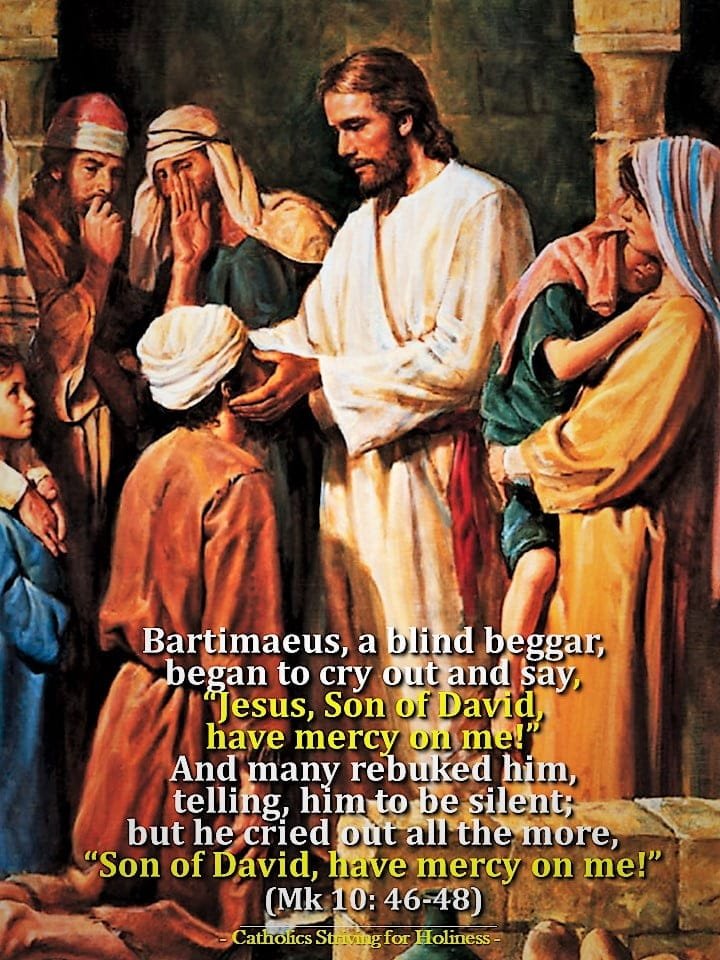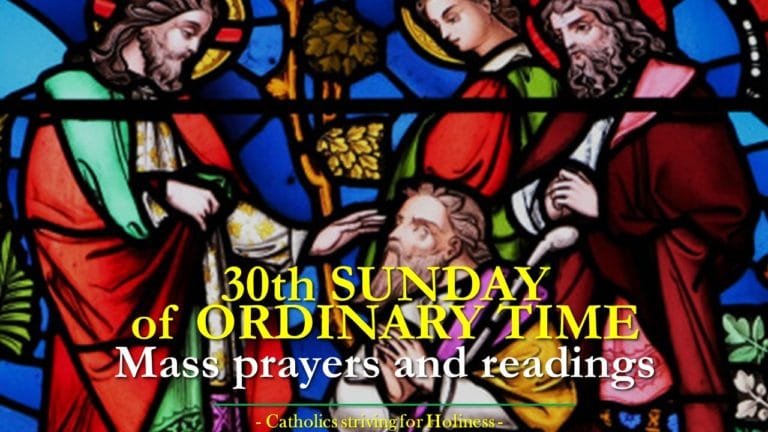POPE FRANCIS ON THE 30TH SUNDAY IN ORDINARY TIME YEAR B
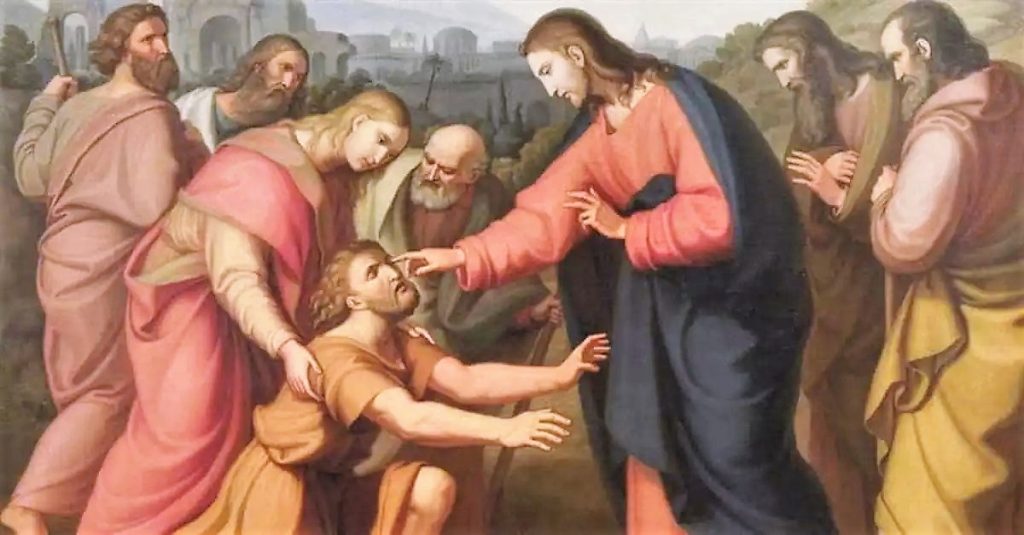
HOMILY OF THE HOLY FATHER FRANCIS
Saint Peter’s Basilica
XXX Sunday in Ordinary Time, 27 October 2024
_________________________________________
Today’s Gospel presents us with Bartimaeus, a blind man forced to beg at the side of the road, an outcast lacking hope. Yet, when he heard Jesus passing by, he began to shout after him. All Bartimaeus could do was to cry out in pain to Jesus and express his desire that he might regain his sight. While others were troubled by his cries and rebuked him, Jesus paused. For God always hears the cry of the poor, and no cry of pain goes unheard by him.
Today, at the conclusion of the General Assembly of the Synod of Bishops, with our hearts filled with gratitude for the moments we have shared, let us reflect on what happened to Bartimaeus. Initially he was “sitting by the roadside” (Mk 10:46), but by the end he was called by Jesus, recovered his sight and “followed him on the way” (v. 52).
The first thing that the Gospel tells us about Bartimaeus is that he was begging by the roadside. His position is typical of someone who sits by the side of a road, caught up in his own grief, as if there were nothing else to do but receive something from the many pilgrims passing through the city of Jericho as Passover drew near. Yet, as we know, if we are truly to live, we cannot remain seated. Life entails being on the move, setting out, dreaming, planning, opening up to the future. Blind Bartimaeus, then, represents that inner blindness which restrains us, keeps us stuck in one place, holds us back from the dynamism of life and destroys our hope.
This can help us reflect not only on our own lives, but also on what it means to be the Lord’s Church. So many things along the way can make us blind, incapable of perceiving the presence of the Lord, unprepared to face the challenges of reality, sometimes unable to offer adequate responses to the questions of so many who cry out to us, as Bartimaeus did to Jesus. We cannot remain inert before the questions raised by the women and men of today, before the challenges of our time, the urgency of evangelization and the many wounds that afflict humanity. Sisters and brothers, we cannot afford to sit back. A sedentary Church, that inadvertently withdraws from life and confines itself to the margins of reality, is a Church that risks remaining blind and becoming comfortable with its own unease. If we remain stuck in our blindness, we will continuously fail to grasp the urgency of giving a pastoral response to the many problems of our world. Let us ask the Lord to send us the Holy Spirit, so that we do not sit in our blindness, which in other words can be a worldliness, complacency, or closed heart. We cannot stay sitting in our blindness.
Yet, we should remember that the Lord passes by every day. The Lord always passes by and pauses in order to attend to our blindness. We should ask ourselves, “Do I hear him passing by? Do I have the capacity to hear the Lord’s footsteps? Do I have the capacity to discern when the Lord is passing by?” It is good if the Synod is urging us as a Church to be like Bartimaeus: a community of disciples who, hearing that the Lord is passing by, feel the joy of salvation, allow ourselves to be awakened by the power of the Gospel, and to cry out to him. The Church does this when it takes up the cry of all the women and men of the world, of those who wish to discover the joy of the Gospel, and of those who have turned away; the silent cry of those who are indifferent; the cry of those who suffer, of the poor and marginalized, of children who are enslaved in so many parts of the world for work; the broken voice of those who no longer have the strength to cry out to God, either because they have no voice or because they are in despair. We do not need a sedentary and defeatist Church, but a Church that hears the cry of the world – I wish to say this even if some might be scandalised – a Church that gets its hands dirty in serving.
Thus, we come to the second aspect. The Gospel tells us that if initially Bartimaeus was seated, at the end we see him following Jesus along the road. This is a typical expression in the Gospel, meaning that he has become the Lord’s disciple and has followed in his footsteps. When the beggar cried out to him, Jesus stopped and called for him. Bartimaeus, from where he was sitting, jumped up on his feet and immediately afterwards regained his sight. Now he can see the Lord; he can recognize God’s action in his life and finally set out to follow him. Let us do likewise. Whenever we are seated and settled, when as a Church we cannot find the strength, the courage or the boldness to arise and continue along the way, let us always remember to return to the Lord and his Gospel. We always need to return to the Lord and the Gospel. As he passes by again and again, we need to listen to his call so that we can get back on our feet and he can heal our blindness; and then we can follow him once more, and walk with him along the way.
I would like to reiterate that the Gospel says of Bartimaeus that he “followed him on the way”. This is an image of the synodal Church. The Lord is calling us, lifting us up when we are seated or fallen down, restoring our sight so that we can perceive the anxieties and sufferings of the world in the light of the Gospel. And when the Lord puts us back on our feet, we experience the joy of following him on the way. We follow the Lord along the way, we do not follow him enclosed in our comforts or we do not follow him in the mazes of our minds. We follow him only along the way. Let us remember never to walk alone or according to worldly criteria, but to walk on the way alongside him.
Brothers and sisters, not a seated Church, but a Church on her feet. Not a silent Church, but a Church that embraces the cry of humanity. Not a blind Church, but a Church, enlightened by Christ, that brings the light of the Gospel to others. Not a static Church, but a missionary Church that walks with her Lord through the streets of the world.
Today, as we give thanks to the Lord for the journey we have made together, we will be able to see and venerate the relic of the carefully restored ancient Chair of Saint Peter. As we contemplate it with the wonder of faith, let us remember that this is the Chair of love, unity and mercy, according to Jesus’ command to the Apostle Peter not to lord it over others, but to serve them in charity. And, as we admire the majestic Bernini Baldachin, more sublime than ever, we can rediscover that it frames the true focal point of the entire basilica, namely the glory of the Holy Spirit. This is the synodal Church: a community whose primacy lies in the gift of the Spirit, who makes us all brothers and sisters in Christ and raises us up to him.
Sisters and brothers, let us therefore continue our journey together with confidence. Today, the word of God speaks to us, as to Bartimaeus: “Take heart; get up, he is calling you”. Do I feel called? Do I feel weak and cannot get up? Do I call for help? Let us throw off the cloak of resignation; let us entrust our blindness to the Lord; let us stand once more and carry the joy of the Gospel through the streets of the world.
Source: https://www.vatican.va/content/francesco/en/homilies/2024/documents/20241027-omelia-conclusione-sinodo.html
EMPHASIS MINE
Copyright © Dicastero per la Comunicazione – Libreria Editrice Vaticana
_______________________
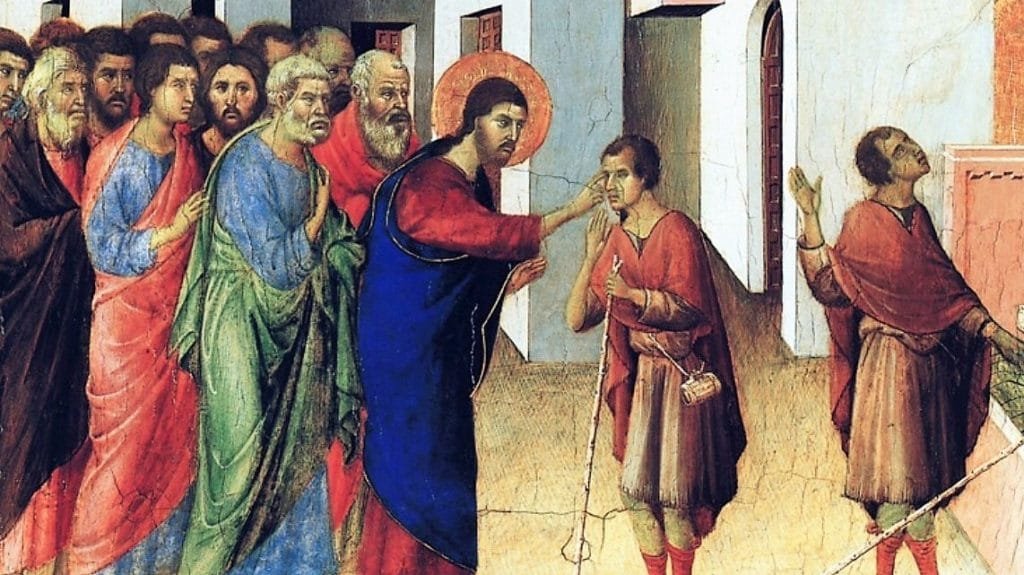
ANGELUS
Saint Peter’s Square
Sunday, 24 October 2021
Dear brothers and sisters, buongiorno!
The Gospel of today’s Liturgy tells of Jesus who, when leaving Jericho, restores the sight of Bartimaeus, a blind man begging by the roadside (cf. Mk 10:46-52). It is an important encounter, the last one before the Lord’s entry into Jerusalem for the Passover. Bartimaeus had lost his sight, but not his voice! For, when he heard that Jesus was about to pass by, he begins to cry out: “Jesus, Son of David, have mercy on me!” (v. 47). And he shouts and shouts. The disciples and the crowd, annoyed by his shouting, rebuke him to make him be quiet. But he shouts even louder: “Son of David, have mercy on me!” (v. 48). Jesus hears, and immediately stops. God always listens to the cry of the poor and is not at all disturbed by Bartimaeus’ voice; rather, he realises it is full of faith, a faith that is not afraid to insist, to knock on the door of God’s heart, despite not being understood and being reproached. And here lies the root of the miracle. Indeed, Jesus says to him: “Your faith has made you well” (v. 52).
Bartimaeus’ faith is evident from his prayer. It is not a timid and standard prayer. First and foremost, he calls the Lord “Son of David”: that is, he acknowledges Jesus as the Messiah, the King who would come into the world. Then he calls Him by name, confidently; “Jesus”. He is not afraid of Him, he does not stay at a distance. And thus, from the heart, he shouts out his entire drama to God who is his friend: “Have mercy on me!” Just that prayer: “Have mercy on me!” He does not ask for some loose change as he does with passers-by. No. He asks for everything from the One who can do everything. He asks people for loose change; he asks everything from Jesus who can do everything. “Have mercy on me, have mercy on all that I am”. He does not ask for a favour, but presents himself: he asks for mercy on his person, on his life. It is not a small request, but it is so beautiful because it is a cry for mercy, that is, compassion, God’s mercy, his tenderness.
Bartimaeus does not use many words. He says what is essential and entrusts himself to God’s love which can make his life flourish again by doing what is humanly impossible. This is why he does not ask the Lord for alms, but makes everything be seen – his blindness and his suffering which was far more than not being able to see. His blindness was the tip of the iceberg; but there must have been wounds, humiliations, broken dreams, mistakes, remorse in his heart. He prayed with his heart. And what about us? When we ask for God’s grace, in our prayer do we also include our own history, our wounds, our humiliations, our broken dreams, our mistakes and our regrets?
“Jesus, Son of David, have mercy on me!” Let us, too, recite this prayer today. And let us ask ourselves: “What is my prayer like?” All of us, let us ask ourselves: “What is my prayer like?” Is it courageous, does it contain the good insistence of Bartimaeus, does it know how to “take hold” of the Lord as he passes, or is it rather content with making a formal greeting every now and then, when I remember? Those lukewarm prayers that do not help at all. Furthermore, is my prayer “substantial”, does it bare my heart before the Lord? Do I take my story and life experience to him? Or is it anaemic, superficial, made up of rituals, without feeling and without heart? When faith is alive, prayer is heartfelt: it does not beg for spare change, it is not reduced to momentary needs. We must ask everything of Jesus, who can do everything. Do not forget this. We must ask everything of Jesus, with my insistence before Him. He cannot wait to pour out his grace and joy into our hearts; but unfortunately, it is we who keep our distance, through timidness, laziness or unbelief.
So many of us, when we pray, do not believe that the Lord can work miracles. I am reminded of the story – which I have seen – of the father who was told by the doctors that his nine-year-old daughter would not spend the night; she was in hospital. And he took a bus and travelled seventy kilometres to the Shrine of Our Lady. It was closed and, clinging to the gate, spent the whole night praying: “Lord, save her! Lord, give her life!” He prayed to Our Lady, all night long, crying out to God, crying from his heart. Then in the morning, when he returned to the hospital, he found his wife weeping. And he thought: “She is dead”. And his wife said: “No-one understands, no-one understands, the doctors say it’s a strange thing, she seems to have healed”. The cry of that man who asked for everything was heard by the Lord who had given him everything. This is not a story: I saw this myself, in the other diocese. Do we have this courage in prayer? To the One who can give us everything, let us ask everything, like Bartimaeus, who was a great teacher, a great master of prayer. May Bartimaeus, with his genuine, insistent and courageous faith, be an example for us. And may Our Lady, the prayerful Virgin, teach us to turn to God with all our heart, confident that He listens attentively to every prayer.
SOURCE: https://www.vatican.va/content/francesco/en/angelus/2021/documents/papa-francesco_angelus_20211024.html
EMPHASIS MINE
__________________________________
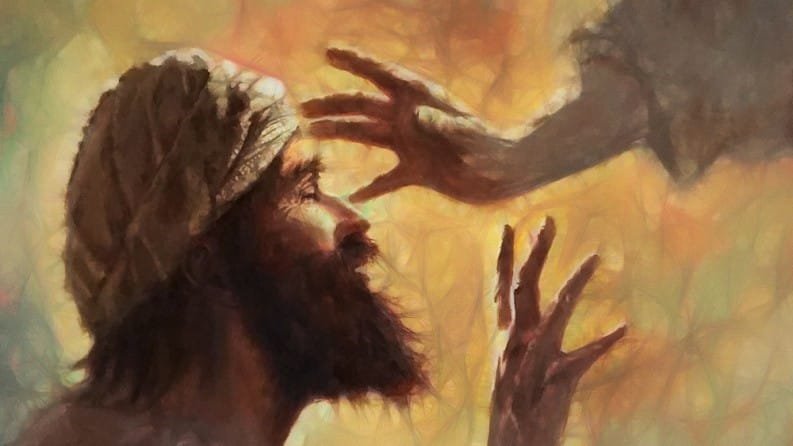
HOMILY OF HIS HOLINESS POPE FRANCIS
30th Sunday in Ordinary Time B, 28 October 2018
The account we have just heard is the last of those that the evangelist Mark relates about the itinerant ministry of Jesus, who is about to enter Jerusalem to die and to rise. Bartimaeus is thus the last of those who follow Jesus along the way: from a beggar along the road to Jericho, he becomes a disciple who walks alongside the others on the way to Jerusalem. We too have walked alongside one another; we have been a “synod”. This Gospel seals three fundamental steps on the journey of faith.
First, let us consider Bartimaeus. His name means “son of Timaeus”. That is how the Gospel describes him: “Bartimaeus son of Timaeus” (Mk 10:46). Yet, oddly, his father is nowhere to be found. Bartimaeus lies alone on the roadside, far from home and fatherless. He is not loved, but abandoned. He is blind and no one listens to him; when he tried to speak, everyone told him to keep quiet. Jesus hears his plea. When he goes to him, he lets him speak. It was not hard to guess what Bartimaeus wanted: clearly, a blind person wants to see or regain his sight. But Jesus takes his time; he takes time to listen. This is the first step in helping the journey of faith: listening. It is the apostolate of the ear: listening before speaking.
Instead, many of those with Jesus ordered Bartimaeus to be quiet (cf. v. 48). For such disciples, a person in need was a nuisance along the way, an obstacle unexpected and unforeseen. They preferred their own timetable above that of the Master, their own talking over listening to others. They were following Jesus, but they had their own plans in mind. This is a risk constantly to guard against. Yet, for Jesus, the cry of those pleading for help is not a nuisance but a challenge. How important it is for us to listen to life! The children of the heavenly Father are concerned with their brothers and sisters, not with useless chatter, but with the needs of their neighbours. They listen patiently and lovingly, just as God does to us and to our prayers, however repetitive they may be. God never grows tired; he is always happy when we seek him. May we too ask for the grace of a heart that listens. I would like to say to the young people, in the name of all of us adults: forgive us if often we have not listened to you, if, instead of opening our hearts, we have filled your ears. As Christ’s Church, we want to listen to you with love, certain of two things: that your lives are precious in God’s eyes, because God is young and loves young people, and that your lives are precious in our eyes too, and indeed necessary for moving forward.
After listening, a second step on the journey of faith is to be a neighbour. Let us look at Jesus: he does not delegate someone from the “large crowd” following him, but goes personally to meet Bartimaeus. He asks him, “What do you want me to do for you?” (v. 51). What do you want… – Jesus is completely taken up with Bartimaeus; he does not try to sidestep him. …me to do – not simply to speak, but to do something. …for you – not according to my own preconceived ideas, but for you, in your particular situation. That is how God operates. He gets personally involved with preferential love for every person. By his actions, he already communicates his message. Faith thus flowers in life.
Faith passes through life. When faith is concerned purely with doctrinal formulae, it risks speaking only to the head without touching the heart. And when it is concerned with activity alone, it risks turning into mere moralizing and social work. Faith, instead, is life: it is living in the love of God who has changed our lives. We cannot choose between doctrine and activism. We are called to carry out God’s work in God’s own way: in closeness, by cleaving to him, in communion with one another, alongside our brothers and sisters. Closeness: that is the secret to communicating the heart of the faith, and not a secondary aspect.
Being a neighbour means bringing the newness of God into the lives of our brothers and sisters. It serves as an antidote to the temptation of easy answers and fast fixes. Let us ask ourselves whether, as Christians, we are capable of becoming neighbours, stepping out of our circles and embracing those who are not “one of us”, those whom God ardently seeks. A temptation so often found in the Scriptures will always be there: the temptation to wash our hands. That is what the crowd does in today’s Gospel. It is what Cain did with Abel, and Pilate with Jesus: they washed their hands. But we want to imitate Jesus and, like him, to dirty our hands. He is the way (cf. Jn 14:6), who stopped on the road for Bartimaeus. He is the light of the world (cf. Jn 9:5), who bent down to help a blind man. Let us realize that the Lord has dirtied his hands for each one of us. Let us look at the cross, start from there and remember that God became my neighbour in sin and death. He became my neighbour: it all starts from there. And when, out of love of him, we too become neighbours, we become bringers of new life. Not teachers of everyone, not specialists in the sacred, but witnesses of the love that saves.
The third step is to bear witness. Let us consider the disciples who, at Jesus’ request, called out to Bartimaeus. They do not approach a beggar with a coin to shut him up, or to dispense advice. They go in Jesus’ name. Indeed, they say only three words to him, and all three are words of Jesus: “Take heart; get up, he is calling you” (v. 49). Everywhere else in the Gospel, Jesus alone says, “Take heart”, for he alone “heartens” those who heed him. In the Gospel, Jesus alone says, “Get up”, and heals in spirit and body. Jesus alone calls, transforming the lives of those who follow him, helping raise up the fallen, bringing God’s light to the darkness of life. So many children, so many young people, like Bartimaeus, are looking for light in their lives. They are looking for true love. And like Bartimaeus who in the midst of that large crowd called out to Jesus alone, they too seek life, but often find only empty promises and few people who really care.
It is not Christian to expect that our brothers and sisters who are seekers should have to knock on our doors; we ought to go out to them, bringing not ourselves but Jesus. He sends us, like those disciples, to encourage others and to raise them up in his name. He sends us forth to say to each person: “God is asking you to let yourself be loved by him”. How often, instead of this liberating message of salvation, have we brought ourselves, our own “recipes” and “labels” into the Church! How often, instead of making the Lord’s words our own, have we peddled our own ideas as his word! How often do people feel the weight of our institutions more than the friendly presence of Jesus! In these cases, we act more like an NGO, a state-controlled agency, and not the community of the saved who dwell in the joy of the Lord.
To listen, to be a neighbour, to bear witness. The journey of faith in today’s Gospel ends in a beautiful and surprising way when Jesus says “Go; your faith has made you well” (v. 52). Yet Bartimaeus had made no profession of faith or done any good work; he had only begged for mercy. To feel oneself in need of salvation is the beginning of faith. It is the direct path to encountering Jesus. The faith that saved Bartimaeus did not have to do with his having clear ideas about God, but in his seeking him and longing to encounter him. Faith has to do with encounter, not theory. In encounter, Jesus passes by; in encounter, the heart of the Church beats. Then, not our preaching, but our witness of life will prove effective.
To all of you who have taken part in this “journey together”, I say “thank you” for your witness. We have worked in communion, with frankness and the desire to serve God’s people. May the Lord bless our steps, so that we can listen to young people, be their neighbours, and bear witness before them to Jesus, the joy of our lives.
Source: https://www.vatican.va/content/francesco/en/homilies/2018/documents/papa-francesco_20181028_omelia-chiusura-sinodo.html
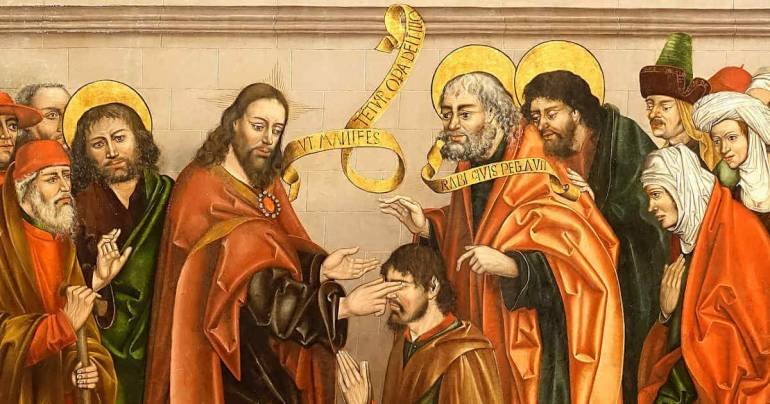
HOMILY OF HIS HOLINESS POPE FRANCIS
Vatican Basilica
30th Sunday in Ordinary Time, 25 October 2015
The three Readings for this Sunday show us God’s compassion, his fatherhood, definitively revealed in Jesus.
In the midst of a national disaster, the people deported by their enemies, the prophet Jeremiah proclaims that “the Lord has saved his people, the remnant of Israel” (31:7). Why did he save them? Because he is their Father (cf. v. 9); and as a Father, he takes care of his children and accompanies them on the way, sustaining “the blind and the lame, the women with child and those in labour” (31:8). His fatherhood opens up for them a path forward, a way of consolation after so many tears and great sadness. If the people remain faithful, if they persevere in their search for God even in a foreign land, God will change their captivity into freedom, their solitude into communion: what the people sow today in tears, they will reap tomorrow in joy (cf. Ps 125:6).
We too have expressed, with the Psalm, the joy which is the fruit of the Lord’s salvation: “our mouth was filled with laughter, and our tongues with shouts of joy” (v. 2). A believer is someone who has experienced God’s salvific action in his life. We pastors have experienced what it means to sow with difficulty, at times in tears, and to rejoice for the grace of a harvest which is beyond our strength and capacity.
The passage from the Letter to the Hebrews shows us Jesus’ compassion. He also “is beset with weakness” (5:2), so that he can feel compassion for those in ignorance and error. Jesus is the great high priest, holy and innocent, but also the high priest who has taken on our weakness and been tempted like us in all things, save sin (cf. 4:15). For this reason he is the mediator of the new and definitive covenant which brings us salvation.
Today’s Gospel is directly linked to the First Reading: as the people of Israel were freed thanks to God’s fatherhood, so too Bartimaeus is freed thanks to Jesus’ compassion. Jesus has just left Jericho. Even though he has only begun his most important journey, which will take him to Jerusalem, he still stops to respond to Bartimaeus’ cry. Jesus is moved by his request and becomes involved in his situation. He is not content to offer him alms, but rather wants to personally encounter him. He does not give him any instruction or response, but asks him: “What do you want me to do for you?” (Mk 10:51). It might seem a senseless question: what could a blind man wish for if not his sight? Yet, with this question made face to face, direct but respectful, Jesus shows that he wants to hear our needs. He wants to talk with each of us about our lives, our real situations, so that nothing is kept from him. After Bartimaeus’ healing, the Lord tells him: “Your faith has made you well” (v. 52). It is beautiful to see how Christ admires Bartimaeus’ faith, how he has confidence in him. He believes in us, more than we believe in ourselves.
There is an interesting detail. Jesus asks his disciples to go and call Bartimaeus. They address the blind man with two expressions, which only Jesus uses in the rest of the Gospel. First they say to him: “Take heart!”, which literally means “have faith, strong courage!”. Indeed, only an encounter with Jesus gives a person the strength to face the most difficult situations. The second expression is “Rise!”, as Jesus said to so many of the sick, whom he took by the hand and healed. His disciples do nothing other than repeat Jesus’ encouraging and liberating words, leading him directly to Jesus, without lecturing him. Jesus’ disciples are called to this, even today, especially today: to bring people into contact with the compassionate Mercy that saves. When humanity’s cry, like Bartimaeus’, becomes stronger still, there is no other response than to make Jesus’ words our own and, above all, imitate his heart. Moments of suffering and conflict are for God occasions of mercy. Today is a time of mercy!
There are, however, some temptations for those who follow Jesus. Today’s Gospel shows at least two of them. None of the disciples stopped, as Jesus did. They continued to walk, going on as if nothing were happening. If Bartimaeus was blind, they were deaf: his problem was not their problem. This can be a danger for us: in the face of constant problems, it is better to move on, instead of letting ourselves be bothered. In this way, just like the disciples, we are with Jesus but we do not think like him. We are in his group, but our hearts are not open. We lose wonder, gratitude and enthusiasm, and risk becoming habitually unmoved by grace. We are able to speak about him and work for him, but we live far from his heart, which is reaching out to those who are wounded. This is the temptation: a “spirituality of illusion”: we can walk through the deserts of humanity without seeing what is really there; instead, we see what we want to see. We are capable of developing views of the world, but we do not accept what the Lord places before our eyes. A faith that does not know how to root itself in the life of people remains arid and, rather than oases, creates other deserts.
There is a second temptation, that of falling into a “scheduled faith”. We are able to walk with the People of God, but we already have our schedule for the journey, where everything is listed: we know where to go and how long it will take; everyone must respect our rhythm and every problem is a bother. We run the risk of becoming the “many” of the Gospel who lose patience and rebuke Bartimaeus. Just a short time before, they scolded the children (cf. 10:13), and now the blind beggar: whoever bothers us or is not of our stature is excluded. Jesus, on the other hand, wants to include, above all those kept on the fringes who are crying out to him. They, like Bartimaeus, have faith, because awareness of the need for salvation is the best way of encountering Jesus.
In the end, Bartimaeus follows Jesus on his path (cf. v. 52). He did not only regain his sight, but he joined the community of those who walk with Jesus. Dear Synod Fathers, we have walked together. Thank you for the path we have shared with our eyes fixed on Jesus and our brothers and sisters, in the search for the paths which the Gospel indicates for our times so that we can proclaim the mystery of family love. Let us follow the path that the Lord desires. Let us ask him to turn to us with his healing and saving gaze, which knows how to radiate light, as it recalls the splendour which illuminates it. Never allowing ourselves to be tarnished by pessimism or sin, let us seek and look upon the glory of God, which shines forth in men and women who are fully alive.
Copyright © Dicastero per la Comunicazione – Libreria Editrice Vaticana
Stay updated: subscribe by email for free TO OUR NEW WEBSITE www.catholicsstrivingforholiness.org (PUT YOUR EMAIL IN THE SUBSCRIBE WIDGET).
We are also in www.fb.com/Catholicsstrivingforholiness. Kindly help more people in their Christian life by liking our page and inviting your family, friends and relatives to do so as well. Thanks in advance and God bless you and your loved ones! Fr. Rolly Arjonillo
